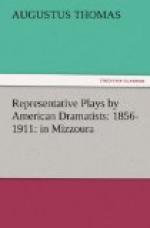Apart from these—the nearest approach of Thomas to the so-called “intellectual” drama—and apart from the racy territorial pieces like “Alabama,” “In Mizzoura,” “Arizona,” and “Colorado,” his plays came from a desire to suit the eccentricities of “stars,” like Lawrence D’Orsey in “The Earl of Pawtucket” and “The Embassy Ball”—blood-cousins in humour to Dundreary—or “On the Quiet” for the dry unctuousness of William Collier. In these plays, his purpose was as deep as a sheet of plate glass, as polished on the surface, and as quick to reflect the rays of smiles.
What one may say of Augustus Thomas with truth is that by temperament he is American; his dramas have a native atmosphere about them. I have never read “The Capitol” or “The Hoosier Doctor,” but it is easy to imagine his treatment of such themes. All of his work bears the Thomas technique. He was more successful than Fitch in dramatization; his “Colonel Carter of Cartersville,” from F. Hopkinson Smith’s novel, and his “Soldiers of Fortune,” from Richard Harding Davis’s story, were adequate stage vehicles,—whereas Fitch failed in his handling of Mrs. Edith Wharton’s “The House of Mirth” and Alfred Henry Lewis’s “Wolfville Stories.” And the reason for Thomas’s success is that he is better equipped for mosaic work in characterization, than for large sweeps of personality. Not one of his plays contains a dominant figure worth remembering afterwards for its distinguishing marks. He has never painted a full portrait; he has only taken snap-shots. His plays have been written as houses are built. More than likely he approaches a subject as he approached “Oliver Goldsmith,” as “largely a scissors and paste-pot undertaking.” But over it, when finished, there is a high polish which denotes guaranteed workmanship. That same care for finish which marks his plays marks his work with the actors, at rehearsal, who have been selected by him with the unerring eye of the illustrator.
It is significant that Thomas began his career as page boy in the 41st Congress; that, after his railroad experience, he studied law; and that, after his subordinate work with the newspapers, he became editor and proprietor of the Kansas City Mirror. Since the death of Bronson Howard, he has been regarded as the Dean of playwrights, and once held the presidency of the Society of American Dramatists. Professor Brander Matthews, Mr. William Gillette, and he represent the theatre in the American Academy of Arts and Letters.
IN MIZZOURA
A PLAY IN FOUR ACTS
By Augustus Thomas
REVISED 1916 BY AUGUSTUS THOMAS
PREFACE.
This preface is one of a number[1] trying to show, each for its particular play, the manner of the play’s conception, whether starting from a theme, a character, or a situation; the difficulty of the start and the larger problems of the story’s development, together with the ways considered and chosen to answer them. It has been thought that such accounts might be of interest, and, in some instances, perhaps, helpful to others beginning on the same kind of work.




